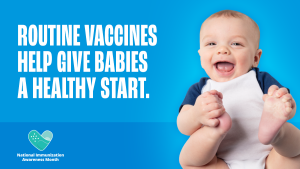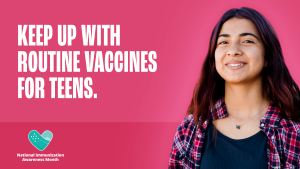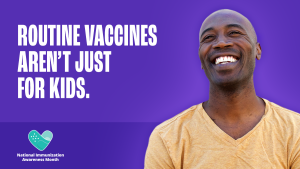Each year, August is dedicated to bringing awareness of the everchanging advancements and life-saving measures involved with vaccination through the annual recognition of National Immunization Month. Since 2020, an even larger emphasis has been placed on getting immunized as COVID-19 vaccines first became available and began making headlines worldwide. Now more than ever, it is important to understand how vaccinations work to protect your health and wellbeing. With 71.8% of Virginians fully vaccinated against the COVID-19 virus, there’s no better time to dive deeper into the ins and outs of immunizations.
What are vaccines and how do they work?
Vaccines stimulate the body’s immune response against diseases and are usually administered through needle injections in the U.S., but some can be given by mouth or sprayed into the nose in other parts of the world.
Specialized immune cells in the body recognize and attack infectious invaders in different ways, as described by the CDC here.
- Macrophages are white blood cells that swallow up and digest germs, plus dead or dying cells. The macrophages leave behind parts of the invading germs called antigens. The body identifies antigens as dangerous and stimulates antibodies to attack them.
- B-lymphocytes are defensive white blood cells; they can produce antibodies to fight off infection.
- T-lymphocytes are another type of defensive white blood cell that recognizes a familiar germ if the body is exposed again to the same disease.
A vaccine introduces a small amount of a specific antigen into the body, allowing the immune system to recognize the antigen and create a set of antibodies to be “deployed” if that antigen ever becomes active again. Antibodies are selective for specific antigens, so vaccines spur development of these specialized immune cells for a specific virus or bacteria. Creating this team of specially trained immune cells takes time and can require retraining – which is why some vaccines require boosters.
What immunizations are necessary?
Currently, approximately 10 vaccines are recommended for children at specific ages beginning at birth through adolescence. You can see the full schedule of recommended vaccines in the United States from the Centers for Disease Control and Prevention here. The number of vaccines suggested for adults varies by specific age groups, in addition to recommended prevention based on certain jobs, international travel, or health conditions. The Virginia Department of Health recommends talking with your healthcare provider if you have questions or concerns about getting vaccinated.
Vaccine Goals
The vaccine schedule for individuals living in the United States is designed to create herd immunity. This population-level immunity occurs when a large enough percentage of the population has developed antibodies to fight a certain virus that its spread from person to person becomes unlikely. Herd immunity can be achieved through vaccination or prior infection, though the World Health Organization strongly recommends using vaccination to reach herd immunity as the severity of infection varies significantly and can result in unnecessary illness and death.
Resources
- COVID-19 Vaccine Portal allows you to pull up your vaccination card on your computer or phone in under a minute
- CDC Immunization Schedule from birth to 18 years old
- CDC Adult Vaccine Assessment Tool helps you identify if you need to catch-up on vaccines or are up to date based on age, health conditions, job, and other risk factors.
- Traveler’s Guide shows you if there are recommended vaccinations for you based on your travel destination
References
https://www.cdc.gov/vaccines/schedules/hcp/imz/child-indications.html#table-indications




